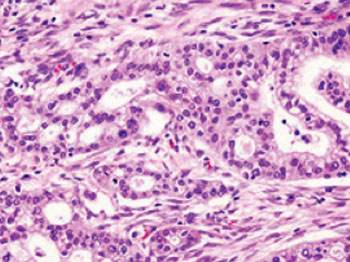Restoration of MicroRNA Activity Slows Progression of Pancreatic Cancer
By LabMedica International staff writers
Posted on 16 Jul 2015
Cancer researchers have linked progression of pancreatic cancer to the loss of microRNA-29 (miR-29) activity.Posted on 16 Jul 2015
Pancreatic cancer (pancreatic ductal adenocarcinoma or PDAC) is the fourth most common cause of cancer death in the Western world. The prognosis is poor, with one- and five-year survival rates of only 20% and 7%, respectively. Therefore, markers of the disease that could help with early diagnosis are needed to improve the prognosis. Statistics from the [US] National Cancer Institute (Bethesda, MD, USA) show that only about 7% of people with pancreatic cancer survive more than five years after diagnosis. In 2013 an estimated 45,220 new cases of pancreatic cancer were expected to be diagnosed with more than 38,460 of the cases being fatal.

Image: Micrograph of pancreatic ductal adenocarcinoma (the most common type of pancreatic cancer) (Photo courtesy of Wikimedia Commons).
Dense fibrotic stroma associated with pancreatic cancer is a major obstacle for drug delivery to the tumor bed and plays a crucial role in pancreatic cancer progression. Current anti-stromal therapies have failed to improve tumor response to chemotherapy and patient survival. Furthermore, recent studies show that stroma impedes tumor progression, and its complete removal accelerates PDAC progression.
Investigators at Indiana University (Indianapolis, USA) used in vitro and in vivo models and PDAC patient biopsies in an effort to understand the molecular mechanisms associated with tumor-stromal interactions.
They reported in the June 22, 2015, online edition of the journal Scientific Reports, that the loss of miR-29 was a common phenomenon of activated pancreatic stellate cells (PSCs)/fibroblasts, the major stromal cells responsible for fibrotic stromal reaction. MiR-29 is a microRNA, a member of the class of RNA fragments about 20 nucleotides long that block gene expression by attaching to molecules of messenger RNA (mRNA) in a fashion that prevents them from transmitting the protein synthesizing instructions they had received from the DNA.
The investigators found that loss of miR-29 correlated with a significant increase in extracellular matrix (ECM) deposition, a major component in PDAC stroma. In contrast, overexpression of miR-29 in activated stellate cells reduced stromal deposition, cancer cell viability, and cancer growth in co-culture.
"We found that the loss of miR-29 is a common phenomenon of pancreatic cancer stromal cells, and that by restoring it, the stromal accumulation and cancer growth was reduced," said senior author Dr. Janaiah Kota, assistant professor of medical and molecular genetics at Indiana University. "The use of miR-29 as a therapeutic agent may be more effective in targeting reactive stroma, as a single miRNA regulates the expression of several genes associated with disease mechanisms."
Related Links:
Indiana University
[US] National Cancer Institute













